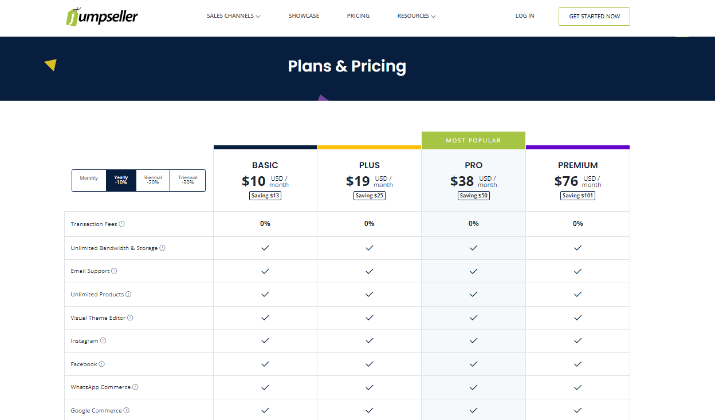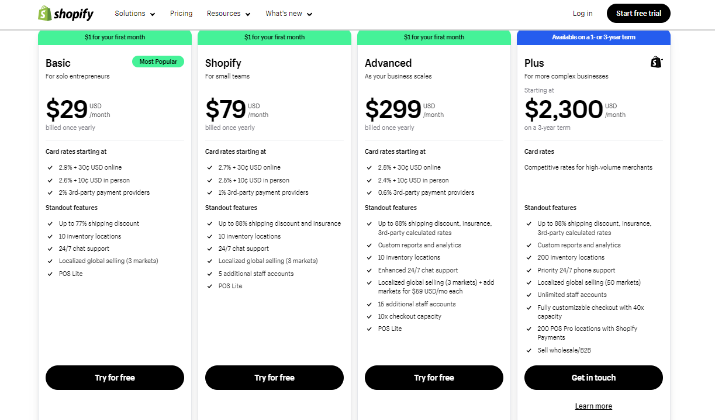When it comes to choosing an ecommerce platform for your online store, the options seem endless. But two names stand out among the rest: Jumpseller and Shopify.
Both these platforms offer robust features and claim to be the best choice for your business needs.
But which one is truly superior? Are you ready to discover the true winner in the battle of Jumpseller vs Shopify?
Let’s dive into the details and find out.
Overview
Jumpseller
Jumpseller is an ecommerce platform that offers a user-friendly experience for small businesses.
Take a look at some of its key features:
- Beginner-Friendly Design: Jumpseller provides a clear onboarding guide to help users set up their online stores easily. The block-based design system is intuitive and easy to work with, making it ideal for beginners.
- International Viability: Jumpseller has proven success in Portugal and Latin America, making it a viable option for businesses looking to expand globally. The platform is fully responsive and user-friendly, catering to a wide audience.
- Customization: Jumpseller offers a range of customization options, allowing users to personalize their online stores to suit their brand identity. From themes to layouts, users can tailor their store to meet their specific needs.
- Support: Jumpseller provides support for users through clear instructions, video resources, and an onboarding section that tracks progress. This support system ensures that users can navigate the platform effectively and make the most of its features.
- Value: Jumpseller offers a robust platform at a competitive price point, making it an attractive option for small businesses looking to establish an online presence. The platform’s features and functionality cater to the needs of growing businesses.
Overall, Jumpseller stands out for its user-friendly design, international viability, customization options, strong support system, and value for small businesses looking to enter the ecommerce market.
Also read: Best Free Shopify Alternatives For Android
Shopify
Shopify is a leading ecommerce platform that allows businesses to create and manage online stores. Here are some of the key features of Shopify:
- Storefront Themes and Customization: Shopify offers over 70 professional and mobile-responsive themes that can be easily customized to match your brand’s look and feel.
- Shipping and Security: Shopify provides a free SSL certificate for every store, automatic shipping rate calculations from major carriers, and automatic tax rate calculations.
- Abandoned Cart Recovery: Shopify’s abandoned cart recovery feature helps track and send automated emails to customers who have added items to their cart but not completed the purchase, helping to recover lost sales.
- Payment Gateways: Shopify integrates with over 70 payment gateways, including its own Shopify Payments, allowing merchants to easily accept payments online.
- Shopify App Store: The Shopify App Store offers thousands of apps that can be integrated to add additional functionality to your online store, such as marketing, inventory management, and accounting tools.
- User-Friendly Interface: Shopify is designed to be easy to use, even for those without technical expertise. It includes wizards and documentation to guide users through setup and management.
- Quick Customer Service: Shopify offers 24/7 customer support to help merchants with any issues that may arise.
- No Coding Skills Required: Shopify’s drag-and-drop editor allows users to build and customize their online store without needing to write any code.
Shopify provides a comprehensive set of features and tools to help businesses of all sizes establish and grow their online presence.
Explore: Best Printful Alternatives For Shopify
Try Shopify free followed by first month at just $1. No credit card required. Limited Time Offer.
Pricing
Jumpseller
Jumpseller offers several pricing plans tailored to different needs.
- Basic Plan: Priced at $11 per month (or $10 per month if billed annually), this plan is ideal for freelancers, small and mid-size businesses. It integrates with PayPal, Google Analytics, and more.
- Plus Plan: This plan costs $21 per month (or $19 per month if paid annually). It supports automated daily product data updates and automated order data synchronization.
- Pro Plan: Priced at $42 per month (or $38 per month if billed annually), this plan enables you to manage 250+ products and offers enhanced support and features.
- Premium Plan: This plan costs $84 per month (or $76 if billed annually) and enables you to manage 50.000+ products.
It is important to note that all these plans feature zero transaction fees.
Shopify
Shopify’s pricing plans have been designed to suit varying needs of businesses. These include:
- Basic Plan: Available at $39 a month (or $29 if paid yearly), this plan is suitable for solo entrepreneurs. It includes features like a fully functional website and blog, discount code engine, fraud analysis tool, unlimited product uploads, free SSL certificate, manual order creation, and 24/7 customer support.
- Shopify Plan: Priced at $105 a month (or $79 if paid annually), this plan is ideal for small teams. It enables the option to list an unlimited number of products and other important functions.
- Advanced Plan: Geared towards larger businesses, this plan is priced at $399 a month ($299 if billed annually) and offers a fully customized package with direct communication with Shopify. It is designed for growing enterprises needing extensive features and support.
- Plus Plan: Tailored for large businesses, this plan priced at $2,300 a month offers a fully customized package with direct communication with Shopify.
Jumpseller offers a more cost-effective pricing structure compared to Shopify. With Jumpseller, you don’t have to worry about transaction fees for each sale, unlike Shopify, which charges a percentage of every transaction.
Check out: Shopify 90 Day Free Trial
Try Shopify free followed by first month at just $1. No credit card required. Limited Time Offer.
Local Shipping & Payment Methods
With Jumpseller, you enjoy the convenience of built-in support for local shipping options and various payment methods.
This means that your customers can choose their preferred shipping option and complete their payment using the method that suits them best.
One of the advantages Jumpseller offers is the ability to create custom shipping labels, ensuring a professional and personalized touch for your packages.
Additionally, Jumpseller automates the process of invoicing, saving you time and effort.
In contrast, Shopify requires the use of external applications for shipping labels, which can be an added inconvenience.
Furthermore, Shopify may not support all local payment methods, potentially limiting your customers’ options during checkout.
Also read: Printify vs Shopify – What’s The Difference?
Multi-Language Feature
When it comes to catering to a global audience, having a reliable multi-language feature for your online store is crucial.
Jumpseller
Jumpseller offers a robust multi-language feature that allows you to effortlessly translate and add different languages to your online store.
With Jumpseller, you have the ability to automatically translate your store’s content, making it accessible to customers around the world.
This feature provides a seamless experience for your customers, enabling them to browse and shop in their preferred language.
Additionally, Jumpseller allows you to customize each language translation, ensuring that your store’s message resonates with your target audience.
Shopify
On the other hand, Shopify’s multi-language feature requires the installation of an external app and a multi-language compatible theme to achieve the same functionality.
This means that you will have to go through additional steps and potentially incur additional costs to enable multi-language support for your online store.
While the option is available, it does add complexity to the setup process.
For a hassle-free experience, Jumpseller’s native multi-language feature stands out by offering an all-in-one solution without the need for external apps or additional theme configurations.
This makes Jumpseller an ideal choice for businesses looking to expand their reach and provide a personalized user experience in multiple languages.
Read this too: Pietra vs Shopify – Which is Better?
Native Digital Products
When it comes to selling digital products on your online store, Jumpseller and Shopify offer different approaches.
Jumpseller provides a native digital products feature that allows you to sell items such as online tickets and photos without the need for external apps.
This built-in feature makes the setup process quick and easy, saving you time and effort.
On the other hand, Shopify requires the use of external apps to sell digital products on your store. While this provides some flexibility, it also adds an extra step to the setup process.
You’ll need to find and install the right app for your digital products, which can be time-consuming.
By choosing Jumpseller, you can eliminate the hassle of integrating and managing external apps, as their platform is designed to support the sale of digital content out of the box.
This means a smoother and more streamlined experience for you and your customers, with no additional steps or complications.
Another interesting read: Systeme.io vs Shopify
Customization
When it comes to customizing your online store and optimizing it for local customers, Jumpseller offers an advantage over Shopify.
With Jumpseller, you gain access to a network of competent local agencies and designers who understand the preferences and trends of your target market.
This eliminates the need to hire foreign agencies or struggle with adapting your store to local customer needs.
Jumpseller’s collaboration with local professionals ensures that your store customization is tailored to meet the demands of your specific market, resulting in a superior browsing and shopping experience for your customers.
These local professionals are well-versed in the design services required to make your online store visually appealing, user-friendly, and optimized for conversions.
Whether you need assistance with store design, layout, or branding, Jumpseller’s local professionals can provide the expertise and support you need.
Their knowledge of your local market allows them to create a store that resonates with your target audience, making it easier for customers to find and purchase your products or services.
With Jumpseller, you can rest assured that your online store is customized to meet the unique needs of your local customers.
You might find this useful: Printful vs Shopify
Try Shopify free followed by first month at just $1. No credit card required. Limited Time Offer.
Data Privacy
When it comes to the privacy of your data, Jumpseller and Shopify have different approaches.
Jumpseller understands the importance of data privacy and ensures that none of your store’s information is shared with other stores or merchants.
This means that your data remains secure and protected, giving you peace of mind.
On the other hand, Shopify shares certain store and customer data with other stores using Shopify Plus. While this may seem beneficial for networking purposes, it can potentially lead to decreased demand for your products.
Competitors who have access to this shared data can target your customers with their advertisements, impacting your business.
Check out: WooCommerce vs Shopify
When it comes to market share, Shopify takes the lead over Jumpseller in every segment. Whether we consider the Top 10K Sites, Top 100K Sites, Top 1M Sites, or even the entire web, Shopify has a larger market share than Jumpseller.
Jumpseller, on the other hand, has not managed to establish a significant market share advantage over Shopify in any category or country.
Although Jumpseller offers several advantages over Shopify, including cost-effective pricing and robust features, Shopify’s overall market dominance cannot be ignored.
Businesses looking for an ecommerce platform with a larger customer base and wider market reach may prefer Shopify due to its larger market share and extensive user base.
Conclusion
After thoroughly comparing Jumpseller and Shopify, it is clear that Jumpseller is the superior choice for your ecommerce platform.
With Jumpseller, you not only benefit from a better pricing structure, but also have access to flexible local payment and shipping options that can cater to your specific business needs.
One of the key advantages of Jumpseller is its extensive language support, allowing you to easily reach a wider audience by offering your online store in multiple languages.
Additionally, Jumpseller’s native digital products feature eliminates the need for external apps, making it easier for you to sell digital content such as tickets and photos.
Moreover, Jumpseller stands out by offering collaboration with local professionals who can help customize your online store according to the preferences of your target market.
With Jumpseller, you can create the online store that meets your specific needs and helps your business grow successfully.













